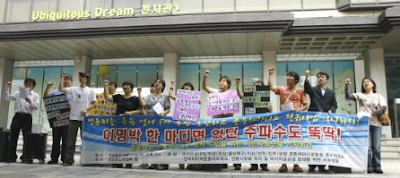 Community radio in Korea doesn't have a long history. The pilot project for community radio started in 2005. During the relatively short period of three years after the initiation, community radio has successfully encouraged locals to participate in the broadcasting, giving social minorities the opportunity to tell their own stories. However, in spite of this accomplishment, the regular project for community radio is not in practice yet. Originally, the regular project was supposed to start two years ago, but the government has been delaying it with the excuse of insufficient frequency range. In the pilot project, the allowed output of power for a sender is merely 1W(radio wave range of 500m ~ 1km in radius). It's hardly heard anywhere.
Community radio in Korea doesn't have a long history. The pilot project for community radio started in 2005. During the relatively short period of three years after the initiation, community radio has successfully encouraged locals to participate in the broadcasting, giving social minorities the opportunity to tell their own stories. However, in spite of this accomplishment, the regular project for community radio is not in practice yet. Originally, the regular project was supposed to start two years ago, but the government has been delaying it with the excuse of insufficient frequency range. In the pilot project, the allowed output of power for a sender is merely 1W(radio wave range of 500m ~ 1km in radius). It's hardly heard anywhere.
The locals have constantly demanded bigger output, but the government has denied it, saying that would jam up the frequency. However, what a surprise! The government, who has insisted there is not enough frequency range, suddenly decided to promote the English FM for foreign residents in the country. It will have the output of staggering 1 kw, which is 1,000 times bigger than what is allowed for community radio. Moreover, They are trying to make 4 of them at the same time. What happened to the 'insufficient frequency range' they have kept saying? "Let there be English FM," said the president, and it took only one month for some spared frequency range to appear out of nowhere. Community radio, for which a great amount of efforts and sacrifices have been made, is now in the crisis of abolition.
In December last year, a research for frequency demand was carried out by Korea Communications Commission, and 29 communities spent their own time and money to find available frequency ranges and submitted the application. 6 months have passed since, but the result of the research has never been announced, and the regular project won't start without it. And now with the English FM being promoted, even less chance for getting frequency will be given to the community radio. The communities that have tried for several years to establish their radio station is now suspicious of the government's true intention.
They are arbitrarily using the public asset of frequency for the one-sided promotion of English FM, and seriously violating the basic right of access and participation in the broadcast. Lately, community radio activists have made 'the Council for Community Radio.' The Council demands that the government should stop the English FM project and start the regular project for community radio as soon as possible. For this purpose, they will fight the government in every available way, including a lawsuit against the English FM. They will also request the result of the frequency demand research, and claim for damages that was done to the communities. ---- from the Mediact Newsletter: CHAE-EUN PARK, staff of policy & research department, MEDIACT Trans. by JAE-HWAN OH